Daniel Garber talks with Jeff Harris about #TIFF22
Hi, this is Daniel Garber at the Movies for Cultural Mining and CIUT 89.5 FM.
Photos by Jeff Harris.
TIFF is now finished, and the stars are long gone, but the movies live on. I spoke with Jeff Harris about this year’s festival: the changes — good and bad — the movies, the celebrities and their fans, audience reactions, standing ovations, prize winners, Oscar bait, sleepers, clunkers, and more.

A massive crowd turned up for the premiere of My Policeman starring Harry Styles. A sea of cell phones tried to catch a glimpse of rock star.
In Part One, we talk about these movies:
- In Conversation With Taylor Swift
- Gutsy (TV series)
- Sidney
- My Policeman (pictured)
- Triangle Of Sadness

Some Weird Al super-fans showed up to the Midnight Madness premiere of Weird: The Al Yankovic Story. One arrived with a homemade puppet of Al – who has become perhaps the most recognizable (or funniest) accordion player in the world.
In Part Two, we discuss:
- Catherine Called Birdy
- The Son
- The Fabelmans
- Aristotle & Dante Discover Secrets…
- Good Night Oppy
- Brother
- Bones Of Crows
- The Colour Of Ink
- Ever Deadly
- Weird: The Al Yankovic Story (pictured)
- Bros
- The Whale
- The Banshees Of Inisherin
I spoke with Jeff Harris in person after TIFF22.
Buffalo bros. Films reviewed: Bros, Dead for a Dollar, Butcher’s Crossing
Hi, this is Daniel Garber at the Movies for culturalmining.com and CIUT 89.5 FM.
This week I’m talking about three guy movies — two westerns and a rom-com. There’s a bounty hunter searching in Mexico for a buffalo soldier; a young adventurer in the old west who joins a team hunting buffalo; and a gay man in New York City who falls for a guy from upstate… though probably not from Buffalo.
Co-Wri/Dir: Nicholas Stoller
Bobby Leiber (Billy Eichner) is a 40 year old, gay New Yorker who hosts a popular podcast. As an undergrad he was discouraged from becoming an actor because he walked “too gay”. In journalism school, he was told his voice sounded too gay to be a newscaster. But his career is finally taking off. He’s on the board of directors of a soon to open LGBTQ+ history museum. His sex life is active — he has frequent sex with men he hooks up with online, but his love life is non-existent. He has never been in a relationship, or even had a second date. Until he meets a guy at a dance club, who is way better-looking than he’s used to.
Aaron Shepard (Luke Macfarlane) is fit, handsome and very masculine — the ideal gay image. So the average-looking Bobby is very surprised that Aaron knows who he is and likes his show. They have sex, but even more surprising, they  actually go on a date afterwards. Bobby discovers that Aaron (who is a probate lawyer) is not just a dumb, boring jock. And Aaron is attracted to Bobby’s manner, sense of humour and self-confidence. Can a small-town, straight-acting bro and a sophisticated gay guy shake free of their preconceptions and prejudices and form a relationship? Or is that just a pipe dream?
actually go on a date afterwards. Bobby discovers that Aaron (who is a probate lawyer) is not just a dumb, boring jock. And Aaron is attracted to Bobby’s manner, sense of humour and self-confidence. Can a small-town, straight-acting bro and a sophisticated gay guy shake free of their preconceptions and prejudices and form a relationship? Or is that just a pipe dream?
Bros — co-written by Billy Eichner — is a laugh-out-loud funny romantic comedy. It satirizes gay life, politics and sex in unexpected ways. The dialogue is hilarious (well at least the  first two-thirds, before it gets more serious) and is full of clever cultural asides, some of which I couldn’t follow, but enough to keep me laughing non-stop. There’s even an ongoing parody of conservative Hallmark TV movies. This isn’t your usual rom-com where opposites are kept apart until they eventually fall for each other and end with their first kiss. In this one, the nudity and sex come first, while dating is the hard part. I was unimpressed by the trailer, so was very happy to find the actual movie much, much better than I expected.
first two-thirds, before it gets more serious) and is full of clever cultural asides, some of which I couldn’t follow, but enough to keep me laughing non-stop. There’s even an ongoing parody of conservative Hallmark TV movies. This isn’t your usual rom-com where opposites are kept apart until they eventually fall for each other and end with their first kiss. In this one, the nudity and sex come first, while dating is the hard part. I was unimpressed by the trailer, so was very happy to find the actual movie much, much better than I expected.
I like this one.
Dir: Walter Hill
It’s the late 19th Century in Albuquerque, New Mexico territory. Max Borlund (Cristoph Waltz) is a gun-slinging bounty hunter whose current assignment is to rescue a rich man’s wife who was kidnapped and smuggled south of the border. Elijah the kidnapper (Brandon Scott) is a Buffalo Soldier in the US Army who deserted his post. Borlund heads south with another Buffalo soldier, Sgt Poe as his guide. (“Buffalo soldier” was an informal term given to the all-Black regiments formed in the west after the civil war.) All he has to do is rescue Mrs Kidd and arrest Elijah in order to collect the very large bounty. But there are a few obstacles in his way.
Joe Cribbens (Willem Dafoe) a notorious card shark Borland arrested five years earlier, is about to be released from jail, and he wants to settle their differences using a gun. Tiberius, a dangerous jefe in Chihuahua, wants his cut of any money Borlund might make — and he has a posse of gunmen to  support him. And finally there’s the kidnappee herself. Rachel Kidd (Rachel Brosnahan) tells Borlund, in no uncertain terms, that she’s with Elijah voluntarily. They fled to Mexico because they’re a mixed-race couple, and it’s her estranged husband, Mr Kidd, who is the real criminal here: he actually wants to kill her, not rescue her. But now Max is in a fix: Who can be trusted? And will justice be served?
support him. And finally there’s the kidnappee herself. Rachel Kidd (Rachel Brosnahan) tells Borlund, in no uncertain terms, that she’s with Elijah voluntarily. They fled to Mexico because they’re a mixed-race couple, and it’s her estranged husband, Mr Kidd, who is the real criminal here: he actually wants to kill her, not rescue her. But now Max is in a fix: Who can be trusted? And will justice be served?
Dead for a Dollar is a classic western done in the style of the 1960s spaghetti westerns. It’s filmed in sepia tones, giving it a weathered, almost nostalgic look. It has shootouts, posses, 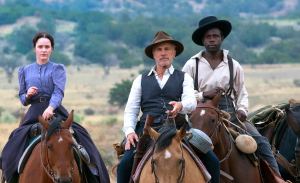 gunfights and ghost towns — the usual stuff — but with a few twists: sympathetic Black and Mexican characters, a tough-as-nails woman who is handy with a gun, and the first showdown I’ve ever seen between two players armed only with horsewhips! Director Walter Hill was huge in the ’80s (with movies like 48 Hours, The Warriors, and a lot of westerns) and he still seems to know what he’s doing.
gunfights and ghost towns — the usual stuff — but with a few twists: sympathetic Black and Mexican characters, a tough-as-nails woman who is handy with a gun, and the first showdown I’ve ever seen between two players armed only with horsewhips! Director Walter Hill was huge in the ’80s (with movies like 48 Hours, The Warriors, and a lot of westerns) and he still seems to know what he’s doing.
Does it work? Occasionally the dialogue veers toward the corny, especially with Willem Dafoe, but Christoph, Brosnahan and the rest are understated just enough to keep it a believable western and not just a farce.
Co-Wri/Dir: Gabe Polsky (Based on the novel by John Williams)
It’s the 1870s in Kansas.
Will (Fred Hechinger) is an idealistic son of a Boston minister, heading west in a covered wagon. He left Harvard to have some real experiences in the wild west. He arrives at Butcher’s Crossing a small frontier town, to visit JD McDonald (Paul Raci), an old family friend who his father had rescued when he was down and out. Now he has made his riches cornering the buffalo skin market in the area. But far from being grateful or kind, he rudely tells Will to go back where he came from — this was no place for a pampered city boy like him. So Will turns to a local legend instead. Miller (Nicholas Cage) is a big guy with a shaved head, a bushy black beard and an abrasive manner. But he agrees to take Will with him on the greatest buffalo hunt ever — if he agrees to finance it. Miller knows of a secret valley in Colorado, with untouched beasts just waiting to be slaughtered. Charlie  (Xander Berkeley) a bible-thumping old souse, will serve as the cook, and Fred, (Jeremy Bobb) a man with a mercenary mind-set will be the all-important skinner, cutting the pelts off the carcasses.
(Xander Berkeley) a bible-thumping old souse, will serve as the cook, and Fred, (Jeremy Bobb) a man with a mercenary mind-set will be the all-important skinner, cutting the pelts off the carcasses.
The four set out into the bush, and to everyone’s surprise Miller’s legendary Colorado valley does actually exist. The men dig in and start their gruesome massacre. The herd is untouched, so has no fear of humans. But the enormity of the mass slaughter starts getting to all of them. Except, that is, the obsessive Miller who is determined to kill every last one. Can the four of them stay together without going crazy? Can they leave the valley before they’re trapped by winter snow? And what will they do with the untold wealth their pelts will bring?
 Butcher’s Crossing is a moving western about the mass slaughter of buffalo. The scenery and cinematography is stunning – they were given access to shoot among actual buffalo herds. It mainly deals with the brittle relationships amongst the four men. The acting Is good, especially Fred Hechinger, reprising his role in the White Lotus TV series as an earnest rich kid trying to find the meaning of life. And Nicholas Cage is allowed to do his requisite I’m going mental! scenes, but mercifully with the sound turned off.
Butcher’s Crossing is a moving western about the mass slaughter of buffalo. The scenery and cinematography is stunning – they were given access to shoot among actual buffalo herds. It mainly deals with the brittle relationships amongst the four men. The acting Is good, especially Fred Hechinger, reprising his role in the White Lotus TV series as an earnest rich kid trying to find the meaning of life. And Nicholas Cage is allowed to do his requisite I’m going mental! scenes, but mercifully with the sound turned off.
The story is similar to Ken Lum’s recent controversial  Edmonton bronze sculpture which shows a buffalo hunter, sitting on a mountain of pelts, confronted by a stoic bison. What both imply (but never explicitly show) is the catastrophic effect the decimation of the buffalo populations had on countless indigenous nations. But that’s where the hidden force of this movie comes from — you can’t help but wonder: what are these men doing and why? The senseless slaughter of millions of buffalo in a very short period of time completely changed North American history. And the film leaves you feeling the heavy weight of our ancestors’ actions.
Edmonton bronze sculpture which shows a buffalo hunter, sitting on a mountain of pelts, confronted by a stoic bison. What both imply (but never explicitly show) is the catastrophic effect the decimation of the buffalo populations had on countless indigenous nations. But that’s where the hidden force of this movie comes from — you can’t help but wonder: what are these men doing and why? The senseless slaughter of millions of buffalo in a very short period of time completely changed North American history. And the film leaves you feeling the heavy weight of our ancestors’ actions.
Bros and Butcher’s Crossing both had their world premieres at TIFF this year. Dead For a Dollar and Bros both open across North America this weekend; check your local listings.
This is Daniel Garber at the Movies, each Saturday morning, on CIUT 89.5 FM and on my website, culturalmining.com
Gems at #TIFF22. Films reviewed: The Hummingbird, Will-o’-the-Wisp, Unruly
Hi, this is Daniel Garber at the Movies for culturalmining.com and CIUT 89.5 FM.
TIFF is finished and after viewing 45+ movies I feel pretty good about it. You’ll be hearing a lot more about TIFF movies like The Fablemans, The Whale, The Glass Onion, Women Talking, The Wonder and The Banshees of Inisherin by the end of the year, but there are also a lot of movies, gems and sleepers, that get left by the wayside, without all the studios promoting them. So this week I’m talking about some of the other movies I saw there — from Italy, Denmark and Portugal — that deserve to be noticed. There’s a rebellious girl trapped on a remote island; a little prince seeking the facts of life in a firehouse; and a man called hummingbird whose fate is guided by a series of unusual events.
Dir: Francesca Archibugi
Marco Carerra is a man who places great importance on seemingly random occurrences. Take a fatal plane ride, for example. When he’s a student in Florence in the early 1980s he starts winning big at poker. But when he boards a plane heading for Yugoslavia with his gaming partner, Duccio, that man begins to freak, shouting hysterically at other passengers that they all are “dead” and the seats on the plane are ruined and decrepit. Marco is eventually forced to pull Duccio off the plane, thus missing the flight and their big card game. But it crashes, killing everyone on board. And Marco, with his deep belief in the significance of ordinary events, ends up marrying the flight attendant who also missed that flight. It’s just fate.
Another important date happened at their summer home on the beautiful Tyrhennian shoreline. The Carrera’s summer home is right next door to the Lattes’ house. And Marco has a huge crush on the beautiful Luisa, their daughter. But the night he thought he would lose his virginity to Luisa (for whom he would hold a torch forever) was also the night when his quarrelling parents went out for the evening, his brooding brother Giancarlo got so drunk he passed out, and their  sorely neglected sister Adele committed suicide, turning all their worlds upside down.
sorely neglected sister Adele committed suicide, turning all their worlds upside down.
The Hummingbird — Marco’s nickname as an unusually small child until a sudden growth spurt in his teens after his father enrols him in hormone treatment — is a wonderful, novelistic movie that traces the intricately woven story of Marco’s life, his love, his family, his wife, his daughter and eventually his  granddaughter. But not in any obvious order. The story jumps back and forth between his childhood, his adolescence, and his middle and old age, keeping you guessing as to why he did what he did. When I say novelistic, I mean literally, with multiple characters coming in and out of his life making shocking revelations along the way, and calling into question his fundamental beliefs. It’s based on the novel Il colibrì by Sandro Veronesi which won the Strega Prize, Italy’s greatest fiction award, and it does feel like a classic story. What’s really surprising is it was published in 2020, during the pandemic, and the film must have been made since then. The movie stars Pierfrancesco Favino as the adult Marco, Berenice Bejo as Luisa Lattes, Nanni Moretti as Marco’s friend, a psychiatrist (no spoilers here), and Kasia Smutniak as his tempestuous wife.
granddaughter. But not in any obvious order. The story jumps back and forth between his childhood, his adolescence, and his middle and old age, keeping you guessing as to why he did what he did. When I say novelistic, I mean literally, with multiple characters coming in and out of his life making shocking revelations along the way, and calling into question his fundamental beliefs. It’s based on the novel Il colibrì by Sandro Veronesi which won the Strega Prize, Italy’s greatest fiction award, and it does feel like a classic story. What’s really surprising is it was published in 2020, during the pandemic, and the film must have been made since then. The movie stars Pierfrancesco Favino as the adult Marco, Berenice Bejo as Luisa Lattes, Nanni Moretti as Marco’s friend, a psychiatrist (no spoilers here), and Kasia Smutniak as his tempestuous wife.
Keep an eye out for this sleeper and be sure watch it when it comes out.
Dir: João Pedro Rodrigues
It’s present-day Portugal. Prince Alfredo (Mauro Costa) is a pale young prince with curly blond hair. heir to the crown. He lives in a palace full of statues and paintings recalling his family’s colonial history. (Though the country gave up its monarchy in 1910, his mother still considers Republican and Castilian the two worst insults in their language.) But with Alfredo coming of age his father, the king, decides to tell him what’s what. He takes him for a walk through the royal forest to admire the tall pine trees there. But his father’s description of tumescent tree trunks throbbing with sap so excites the lad, that he is forced to rethink his future. He doesn’t want to be king anymore, now he wants to be a fireman — specifically one who will protect those trees, about which he has an erotic attachment.
At the fire station, Afonso (André Cabral) a handsome black student is tasked with introducing the prince to the firehouse and the forest. He introduces him to the other fireman, they practice exercises, search and rescues, recussitation, fireman carries, and sliding down poles, but for Alfredo, everything has a sexual subtext. Soon the subtext turns to out-and-out sex, with the two young fireman rolling  around on the forest floor while shouting pornographic and racist epithets in the throws of ecstasy. But can the the little prince find happiness in the arms of a fireman? Or are his regal responsibilities too heavy a burden to bear?
around on the forest floor while shouting pornographic and racist epithets in the throws of ecstasy. But can the the little prince find happiness in the arms of a fireman? Or are his regal responsibilities too heavy a burden to bear?
Will o’the Wisp is one of the strangest, least classifiable films you’ve ever seen. It’s an historical romantic science fiction comedy, and an arthouse-modern dance-  musical satire. It’s only 67 minutes long, but in that short time you’ll see The-Sound-of-Music kids in school uniforms singing weird songs as they pop their heads out from behind trees; homoerotic exercise montages, and elaborate dance routines on the firehouse floor. I can’t say I understood all the cultural references that had the Portuguese viewers in the audience howling with laughter, but I could experience the beauty, ridiculousness and shock running throughout the picture.
musical satire. It’s only 67 minutes long, but in that short time you’ll see The-Sound-of-Music kids in school uniforms singing weird songs as they pop their heads out from behind trees; homoerotic exercise montages, and elaborate dance routines on the firehouse floor. I can’t say I understood all the cultural references that had the Portuguese viewers in the audience howling with laughter, but I could experience the beauty, ridiculousness and shock running throughout the picture.
Co-Wri/Dir: Malou Reymann
It’s the 1930s in a working-class Copenhagen neighbourhood. Maren (Emilie Kroyer Koppel) is a free-thinking teenaged girl who knows what she likes and what she hates. She likes getting drunk, dancing to jazz and hooking up with guys. And she hates authority figures — including her mom — telling her what to do. But when her family cuts her off and she becomes a ward of the state, she doesn’t realize her past actions will have grave consequences. She refuses to cooperate with a doctor (Anders Heinrichsen) trying to diagnose her “ailment”. He declares her unruly and out of control, and sends her off to a remote island known for its hospital for mentally handicapped women. Sprogø island is festooned with pretty flowers and picturesque homes where the patients are taught to be submissive, cooperative, quiet girls, under the watchful eye of Nurse Nielsen (Lene Maria Christensen). They are schooled in sewing, cooking and cleaning on the all-female island (though Marin is able to secretly meet with a young repairman). It’s a hospital, not a prison, she is told, but there’s no way to escape. And if you disobey, or even spread bad attitudes, you are strapped to a table and kept in solitary confinement.
Her roommate, Sørine (Jessica Dinnage) acts as the rat, reporting on any woman  who disobeys the rules. But as Maren gets to know her better she soon discovers the real reason for Sørine’s behaviour: she just wants to be reunited with the child they took away from her. Will Maren learn to accept her fate? Will she find a way to escape the island? Or is she stuck there forever?
who disobeys the rules. But as Maren gets to know her better she soon discovers the real reason for Sørine’s behaviour: she just wants to be reunited with the child they took away from her. Will Maren learn to accept her fate? Will she find a way to escape the island? Or is she stuck there forever?
Unruly is a deeply moving drama based on an actual hospital that operated in Denmark until the 1960s. Its many crimes included involuntary sterilization, mis-diagnoses, torture and authoritarian rule. Instead of having a series of stock characters, with easy to categorize heroes and villains, all the women develop over the course of the film, giving it an unexpected profundity. This film is a lovely and tragic look at a terribly flawed institution and the people it affected.
Will-o’-the-Wisp, The Hummingbird, and Unruly all premiered at TIFF.
This is Daniel Garber at the Movies, each Saturday morning, on CIUT 89.5 FM and on my website, culturalmining.com
Daniel Garber talks with Sean Garrity and Jonas Chernick about The End of Sex at #TIFF22
 Hi, this is Daniel Garber at the Movies for culturalmining.comand CIUT 89.5 FM.
Hi, this is Daniel Garber at the Movies for culturalmining.comand CIUT 89.5 FM.
Photos by Jeff Harris.
Josh and Emma (Emily Hampshire) are a happily-married couple with two daughters they adore. They are sending them off to winter camp for a week, which means this will be their first time alone in a decade, free to do whatever they want. What do they want? Sex of course. But after their first try they realize they’ve both forgotten how to do anything sexual other than faking orgasms.
So they decide to spice things up a bit. But this puts them both under a lot of  pressure… what if it doesnt work? Could the end of sex mean the end of marriage?
pressure… what if it doesnt work? Could the end of sex mean the end of marriage?
The End of Sex is a comic romp about men, women; thruples, swingers and kink, along with love, fidelity, and possible adultery. It lays bare the worst sexual insecurities and anxieties of suburban life .
 The film is directed by the prolific, award winning filmmaker Sean Garrity and written by and starring his frequent collaborator the equally formidable and prize-winning Jonas Chernick (The Last Mark, James vs His Future Self, A Swingers’ Weekend).
The film is directed by the prolific, award winning filmmaker Sean Garrity and written by and starring his frequent collaborator the equally formidable and prize-winning Jonas Chernick (The Last Mark, James vs His Future Self, A Swingers’ Weekend).
I spoke with Sean and Jonas on site at TIFF22.
The End of Sex had its World Premiere at TIFF, and will be released later this year.
I previously interviewed Sean Garrity in 2012, and again, with Jonas Chernick, in 2016.
War movies at #TIFF22. Films reviewed: The Inspection, The Greatest Beer Run Ever, All Quiet on the Western Front
Hi, this is Daniel Garber at the Movies for culturalmining.com and CIUT 89.5 FM.
When military budgets soar, and “war games” are held more frequently, when Presidents and Prime Ministers make speeches about liberty and democracy, when lots of military experts start appearing on cable news networks, rattling their sabres… it usually means governments are gearing up for war. And art imitates life. War movies — you know, the kind of films with all-male casts showing bravery and camaraderie, and lots and lots of guns, tanks and bombs — are becoming popular again.
This week I’m talking about three new war movies that had their world premieres at TIFF. There’s high schoolers in Germany who want to enlist in WWI, a guy from New York who wants to bring beer to his buddies in Vietnam, and a homeless black, gay man who wants to join the marines.
Wri/Dir: Elegance Bratton
Ellis French (Jeremy Pope) is a 25-year old man who sleeps in a homeless shelter in Jersey City, NJ. His single mother (Gabrielle Union), threw him out as a teenager when he came out as gay. He spent the next 10 years living on the streets. Now he plans a new beginning: to turn his life around by joining the marines. But bootcamp is not a nurturing environment. As the sergeants say, we are going to break you all down, and if you survive it, we’ll build you back up again. The breaking down process consists of bullying and violence visited on anyone deviating the norm, be they gay, muslim or just insecure. Sgt Laws (Bokeem Woodbine), in particular, has it in for French, and seems to want kill him — literally. Another recruit, Harvey (McCaul Lombardi) goes out of his way to make French’s life in bootcamp unbearable.  Luckily he does find a few friends, including Sgt Rosales, who takes his side. Can he survive bootcamp and become a marine? And can he ever make his estranged mother proud of him again?
Luckily he does find a few friends, including Sgt Rosales, who takes his side. Can he survive bootcamp and become a marine? And can he ever make his estranged mother proud of him again?
The inspection is based on the memoirs of the film’s writer/director Elegance Bratton. It’s a passionate and deeply-moving first film about a gay son and his fundamentalist 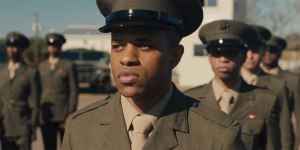 mother, while trying to succeed in a toxic environment. There have been many movies before about life in bootcamp (especially Stanley Kubrick’s Full Metal Jacket) even for a gay man (the South African film Moffie, for example) but The Inspection is still a new take. My only criticism is it seems to be, as a whole, an “oorah-oorah” celebration of military life, despite the prejudice and corruption within it. Without a negative thought, anywhere, about war itself.
mother, while trying to succeed in a toxic environment. There have been many movies before about life in bootcamp (especially Stanley Kubrick’s Full Metal Jacket) even for a gay man (the South African film Moffie, for example) but The Inspection is still a new take. My only criticism is it seems to be, as a whole, an “oorah-oorah” celebration of military life, despite the prejudice and corruption within it. Without a negative thought, anywhere, about war itself.
Co-Wri/Dir: Peter Farrelly
It’s 1967 in Inwood, N.Y., a white, working-class neighbourhood in northern Manhattan. Chicky Donohue (Zach Efron) is a high school drop out who sleeps in everyday and during waking hours can usually be found getting drunk with his buddies at a local bar. Full of piss and vinegar, Chick has lots of big ideas but rarely follows through; no one take him seriously. Lots of his friends and neighbours either signed up or were drafted to serve in Vietnam, but his time served in the Merchant Marines exempts him. His sister marches in rallies against the Vietnam War at Columbia, but Chicky is firmly on the America, Love it Or Leave it side.
But one day, sitting at the bar with his friends, he wonders why no one is doing anything for their buddies in Nam: Minogue, Pappas, Duggan and the rest. So he boasts he’ll buy them some beer and give it to them personally. And that’s what he does — fills a duffel bag with cans of PBR, signs up on a ship headed for Saigon, and just goes there. His ship captain gives him three days to find his friends if he ever wants to leave Vietnam. The only Americans who travel in that country are journalists or military. And no one goes north into battle zones voluntarily. Except Chicky. He starts tracking them down to everyone else’s disbelief. As they say, only someone as dumb as him could survive a trip like this.
is doing anything for their buddies in Nam: Minogue, Pappas, Duggan and the rest. So he boasts he’ll buy them some beer and give it to them personally. And that’s what he does — fills a duffel bag with cans of PBR, signs up on a ship headed for Saigon, and just goes there. His ship captain gives him three days to find his friends if he ever wants to leave Vietnam. The only Americans who travel in that country are journalists or military. And no one goes north into battle zones voluntarily. Except Chicky. He starts tracking them down to everyone else’s disbelief. As they say, only someone as dumb as him could survive a trip like this.
 He happily passes as a CIA agent until he witnesses what they actually do (like the torture and murder of prisoners). And the Vietnamese in the countryside aren’t welcoming him with open arms — they’re terrified he’s going to murder them. And those bombers all around? They’re dropping napalm everywhere. Later he joins forces with a journalist (Russel Crowe) to discover the truth. But will he ever get the beer to his buddies and make it back alive?
He happily passes as a CIA agent until he witnesses what they actually do (like the torture and murder of prisoners). And the Vietnamese in the countryside aren’t welcoming him with open arms — they’re terrified he’s going to murder them. And those bombers all around? They’re dropping napalm everywhere. Later he joins forces with a journalist (Russel Crowe) to discover the truth. But will he ever get the beer to his buddies and make it back alive?
The Greatest Beer Run Ever is a fun and fast-moving bro-dramedy based on a true story. It’s set during the Tet Offensive as the war escalates. It has a terrific soundtrack of 60s pop and psychedelic music. Zach Efron is good as a dumb cluck who gradually wakes up to what the war is really about. And while there are some Vietnamese characters, like most American war movies, it’s all about America. It’s hard to tell whether this film is pro-war or anti-war; rather it seems to be pro-soldiers but against the war in Vietnam and especially the lies the generals told.
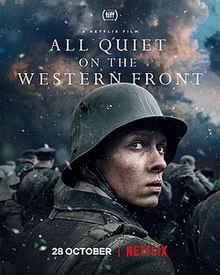 All Quiet on the Western Front (Im Westen nichts Neues)
All Quiet on the Western Front (Im Westen nichts Neues)
Dir: Edward Berger
(based on the novel by Erich Maria Remarque)
It’s 1917 and the world is at war. Paul Bäumer (Felix Kammerer) is a skinny student with glasses at a Catholic boys’ school in a German town. After a rousing speech by their schoolmaster — who dubs the boys “Iron Youth” — all of his classmates rush to join the fight for God, the Kaiser and the Fatherland. But Paul is still too young to enlist, so he forges a letter to sign up with his friends, looking forward to the fun and adventure that surely lies ahead.
But once they arrive in occupied northern France, they soon 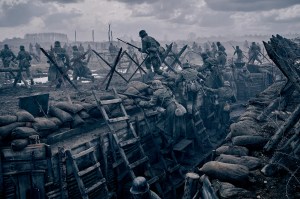 discover this war consists of an endless wasteland of trenches. The “new” uniforms they’re fitted with are recycled from the bodies of dead soldiers. They are forced to train wearing horrible gas masks, and thrown into battle. And a hellish fight it is. Paul — along with his friends Haie, Kropp, Müller, Kat and Tjaden — soon realizes that the only way they’re going home is in a coffin.
discover this war consists of an endless wasteland of trenches. The “new” uniforms they’re fitted with are recycled from the bodies of dead soldiers. They are forced to train wearing horrible gas masks, and thrown into battle. And a hellish fight it is. Paul — along with his friends Haie, Kropp, Müller, Kat and Tjaden — soon realizes that the only way they’re going home is in a coffin.
 All Quiet on the Western Front is a scathing look at the machinery of war and how it uses soldiers as cannon fodder. Even while a German diplomat (Daniel Brühl) is busy negotiating armistice, the generals continue killing as many soldiers as they can until the bitter end. The film graphically shows soldiers incinerated by flame throwers, shot, bombed, stabbed by bayonets, and run over by tanks… even killed in brutal, hand-to-hand combat by the main sympathetic characters. While it provides some relief — one soldier steals a goose from a farm to the joy of his squad-mates; another falls for an art deco poster of a French woman that he sticks to the trench wall — there’s a feeling of doom pervading the entire movie. It has good acting, a
All Quiet on the Western Front is a scathing look at the machinery of war and how it uses soldiers as cannon fodder. Even while a German diplomat (Daniel Brühl) is busy negotiating armistice, the generals continue killing as many soldiers as they can until the bitter end. The film graphically shows soldiers incinerated by flame throwers, shot, bombed, stabbed by bayonets, and run over by tanks… even killed in brutal, hand-to-hand combat by the main sympathetic characters. While it provides some relief — one soldier steals a goose from a farm to the joy of his squad-mates; another falls for an art deco poster of a French woman that he sticks to the trench wall — there’s a feeling of doom pervading the entire movie. It has good acting, a  soundtrack that is as brilliantly ominous as the theme from Jaws, the photography is deadly, and the makeup — soldiers’ faces coated in a deathly layer of mud and blood — is especially striking. It’s as violent as American movies like Saving Private Ryan, or Hacksaw Ridge, but without the veneer of heroism and bravery. It shows the futility of warfare in all its enormity. This is a gruelling and shocking testament against all war and the military industrial complex.
soundtrack that is as brilliantly ominous as the theme from Jaws, the photography is deadly, and the makeup — soldiers’ faces coated in a deathly layer of mud and blood — is especially striking. It’s as violent as American movies like Saving Private Ryan, or Hacksaw Ridge, but without the veneer of heroism and bravery. It shows the futility of warfare in all its enormity. This is a gruelling and shocking testament against all war and the military industrial complex.
All Quiet on the Western Front, The Inspection and The Greatest Beer Run Ever all had their world premieres at TIFF, which continues through the weekend.
This is Daniel Garber at the Movies, each Saturday morning, on CIUT 89.5 FM and on my website, culturalmining.com
Daniel Garber talks with Buffy Sainte-Marie about Buffy Sainte-Marie: Carry It On at #TIFF22
 Hi, this is Daniel Garber at the Movies for culturalmining.com and CIUT 89.5 FM.
Hi, this is Daniel Garber at the Movies for culturalmining.com and CIUT 89.5 FM.
Buffy Sainte Marie was born to Cree parents on a reserve in the Qu’Apelle valley Saskatchewan but was adopted and raised by a family with Mi’kmaq roots in Massachusetts. She grew up musically-inclined and sang folk songs in Yorkville and Greenwich Village coffee houses. Her dynamic guitar style and distinctive vibrato set her apart.
The songs she wrote and performed climbed the charts and were covered by hundreds of other musicians, from Elvis to  Donavan, Joni Mitchell to Barbra Streisand. Her song Universal Soldier became an anthem of the anti-war movement while Now That the Buffalo’s Gone did the same for the American Indian Movement. She starred in movies and on TV, became a regular on Sesame Street, won countless awards, and was the first — and for many years only — indigenous person to win an Oscar.
Donavan, Joni Mitchell to Barbra Streisand. Her song Universal Soldier became an anthem of the anti-war movement while Now That the Buffalo’s Gone did the same for the American Indian Movement. She starred in movies and on TV, became a regular on Sesame Street, won countless awards, and was the first — and for many years only — indigenous person to win an Oscar.
 Her story is told in a new documentary by Madison Thomas called Buffy Sainte-Marie: Carry It On. Narrated by Taj Mahal, Robbie Robertson, Joni Mitchell and others, and Buffy Ste Marie herself, it combines period footage and personal photos, dramatizations, and lots of music and concerts, both vintage and new.
Her story is told in a new documentary by Madison Thomas called Buffy Sainte-Marie: Carry It On. Narrated by Taj Mahal, Robbie Robertson, Joni Mitchell and others, and Buffy Ste Marie herself, it combines period footage and personal photos, dramatizations, and lots of music and concerts, both vintage and new.
I spoke to Buffy Sainte-Marie on site at TIFF22.
Buffy Sainte-Marie: Carry It On had its world premiere at TIFF and is opening at the Hot Docs Cinema later this month.
Daniel Garber talks with Sam Soko and Lauren deFilippo at #TIFF22 about their new doc Free Money
Hi, this is Daniel Garber at the Movies for culturalmining.com and CIUT 89.5 FM.
Photos of Lauren DeFilippo a nd Sam Soko by Jeff Harris.
nd Sam Soko by Jeff Harris.
Kogutu is a poor, east African village in Kenya. Some of the villagers have kids who can’t afford schooling, while others have a bleak future ahead of them. Various foreign NGOs have come and gone over the years, leaving poverty and disappointment in their wake. But the latest one tries a different tact: They’re offering a monthly stipend paid to all adult members of the village for over a decade, to see if this transforms their lives. But what’s the catch? And what do they mean by “free money”?
Free Money is a new documentary that looks at the effects of  UBI, Universal Basic Income, on the people who receive it, and those who don’t. The film was made over many years tracing changes in the villagers, concentrating on the lives of three villagers. The film is directed by two award-winning
UBI, Universal Basic Income, on the people who receive it, and those who don’t. The film was made over many years tracing changes in the villagers, concentrating on the lives of three villagers. The film is directed by two award-winning  documentarians. Lauren DeFilippo’s film acclaimed doc Ailey played theatrically in Toronto and across North America. and Nairobi-based Sam Soko’s film Softie was a big hit at Toronto’s Hot Docs International documentary film fest.
documentarians. Lauren DeFilippo’s film acclaimed doc Ailey played theatrically in Toronto and across North America. and Nairobi-based Sam Soko’s film Softie was a big hit at Toronto’s Hot Docs International documentary film fest.
Free Money had its world premiere at TIFF.
I spoke with Lauren and Sam on-site at #TIFF22.
Indigenous films at TIFF22. Movies reviewed: Ever Deadly, We Are Still Here
 Hi, this is Daniel Garber at the Movies for culturalmining.com and CIUT 89.5 FM.
Hi, this is Daniel Garber at the Movies for culturalmining.com and CIUT 89.5 FM.
TIFF, the Toronto International Film Festival is back again with guns ablazin’, after a two-year hiatus. Yes, TIFF didn’t actually stop over the past two years — there were some great films online in 2020 and some in-person shows during last-year’s hybrid version, but very few people were in actual attendance. No celebs, no parties, no volunteers, no lineups, and no red  carpets. When the anti-piracy laws popped up on your home screen, there was no crowd there to say Grrrrr. You couldn’t turn to the stranger sitting beside you and ask what did you think of this movie. It felt more like a simulacrum than an actual event.
carpets. When the anti-piracy laws popped up on your home screen, there was no crowd there to say Grrrrr. You couldn’t turn to the stranger sitting beside you and ask what did you think of this movie. It felt more like a simulacrum than an actual event.
Well, this year it’s on again,
They’re sticking a toe in the water to see how it feels. It’s called the TIFF Experience (whatever that means) and you can experience it right now, if you go down to King Street West in Toronto, between Peter and University. Even if you’re not up to going indoors yet, they’re showing outdoor screenings of  classic movies. On stage, there are free concerts, and there are always sponsors handing out free samples to munch on, street performers, people dressed up, fans waiting to photograph arriving celebrities, the whole kit and kaboodle. This is pre-recorded so I can’t promise that’s what it will be but that’s prediction. It’s actually fun. That’s just on this weekend, so if you’re in Toronto, you should drop by.
classic movies. On stage, there are free concerts, and there are always sponsors handing out free samples to munch on, street performers, people dressed up, fans waiting to photograph arriving celebrities, the whole kit and kaboodle. This is pre-recorded so I can’t promise that’s what it will be but that’s prediction. It’s actually fun. That’s just on this weekend, so if you’re in Toronto, you should drop by.
This week I’m talking about two new movies playing at TIFF, both on indigenous peoples in the two antipodes. There’s throat singing in the far north and a new telling of history, far, far south of the equator.
But first here are a few other TIFF movies I can’t wait to see.
MOVIES AT TIFF
 Chevalier (Stephen Williams) is about a little-known Guadaloupe-born composer in Paris during Mozart’s era. I want see it because it stars Kelvin Harrison Jr, one of the best new actors around who creates an entirely new character for each movie he’s in to the point he’s virtually unrecognizable.
Chevalier (Stephen Williams) is about a little-known Guadaloupe-born composer in Paris during Mozart’s era. I want see it because it stars Kelvin Harrison Jr, one of the best new actors around who creates an entirely new character for each movie he’s in to the point he’s virtually unrecognizable.
 Steven Spielberg has a world premier at TIFF with The Fablemans, his first autobiographical movie. Why do I want to see it? I’m just really curious to see what he did.
Steven Spielberg has a world premier at TIFF with The Fablemans, his first autobiographical movie. Why do I want to see it? I’m just really curious to see what he did.
 Women Talking is based on a book by Mirriam Toews about a Mennonite-type colony. It stars Rooney Mara, Claire Foy, Jessie Buckley, Sheila McCarthy, Frances McDormand, but I really want to see it because it’s directed by Sarah Polley.
Women Talking is based on a book by Mirriam Toews about a Mennonite-type colony. It stars Rooney Mara, Claire Foy, Jessie Buckley, Sheila McCarthy, Frances McDormand, but I really want to see it because it’s directed by Sarah Polley.
The Kingdom Exodus is about a weird Danish hospital. It’s a  TV show, something I rarely bother to watch at TIFF, and I know nothing about it, but the reason I want to see it is it’s directed by Lars von Trier, and I’ll watch anything he makes, no matter how painful.
TV show, something I rarely bother to watch at TIFF, and I know nothing about it, but the reason I want to see it is it’s directed by Lars von Trier, and I’ll watch anything he makes, no matter how painful.
 And finally I hope to catch The Hotel, about a bunch of Chinese people stranded in a hotel in Thailand during 2020’s Spring Festival, just as the pandemic lockdown hit. I want to see it because it’s directed by Wang Xiaoshuai, who is an under-appreciated but skilled and thoughtful filmmaker.
And finally I hope to catch The Hotel, about a bunch of Chinese people stranded in a hotel in Thailand during 2020’s Spring Festival, just as the pandemic lockdown hit. I want to see it because it’s directed by Wang Xiaoshuai, who is an under-appreciated but skilled and thoughtful filmmaker.
Dir:Tanya Tagaq and Chelsea McMullan
Tanya Tagaq is an Inuit throat singer and performance artist from Nunavut. Ever Deadly documents a performance accompanied by musicians and singers. It’s experimental, avant-garde music interspersed with stories and poems recited as part of the concert. Throat singing is a traditional Inuit art form, but she also experiments with it, in a unique, highly sexual, sensual, visceral, animalistic and at times even supernatural voice. If you’ve seen her before you’ll know what I mean. The film is also about her family’s history, and that of Canada. Her nomadic grandparents were forcibly relocated to a barren arctic area, with nowhere to hunt or fish, in order to  claim sovereignty of the land along the northwest passage. Chelsea McMullan also includes stunning scenes of the stark arctic landscape, polar bears, migrating birds, aurora borealis. And not just the visuals but also the sounds like the unique squeaking crunch of walking on pebbles on a beach. There are vintage footage and photos contrasting lawmakers in parliament with Inuit kids gleefully eating bloody raw seal meat. And grotesque, highly-sexualized animated drawings.
claim sovereignty of the land along the northwest passage. Chelsea McMullan also includes stunning scenes of the stark arctic landscape, polar bears, migrating birds, aurora borealis. And not just the visuals but also the sounds like the unique squeaking crunch of walking on pebbles on a beach. There are vintage footage and photos contrasting lawmakers in parliament with Inuit kids gleefully eating bloody raw seal meat. And grotesque, highly-sexualized animated drawings.
If you’ve ever seen Tagaq perform you’ll know exactly why you should see this, but if you haven’t, it’s time for you to experience it.
Dir: (Various)
At the height of the British Empire maps were coloured pink on every continent, showing both colonies and the so-called Dominions, areas, like Canada, Australia and New Zealand that were settled by Europeans who make up most of their populations. But these places weren’t empty when the British arrived.
This film rewrites the history of Australia, New Zealand and the South Pacific as seen from an indigenous point of view. It’s made by eight filmmakers, four each from Australia and Aotearoa, and it consists of a number of scenes set in the past, present and future. The first British ships appear on the horizon to a mother and daughter catching fish. A settler lost in the bush demands an aboriginal guide show him the way back to his town. A Maori village debates whether to go to war against settlers, ending in a Haka war dance. And a soldier in the trenches of Gallipoli, has an unusual conversation with his enemy, a Turkish soldier. There’s also a dystopian view if the future, and a number set in the present day, including a clandestine graffiti artist and a young protestor. One of the  most moving ones is about an ordinary guy, a tradesman, just trying to buy a bottle of wine from a grog shop (liquor store), who is stopped each time by an abusive cop because he’s indigenous, and it’s Northern Territory where, apparently, it’s legal to routinely treat some people as second-class citizens.
most moving ones is about an ordinary guy, a tradesman, just trying to buy a bottle of wine from a grog shop (liquor store), who is stopped each time by an abusive cop because he’s indigenous, and it’s Northern Territory where, apparently, it’s legal to routinely treat some people as second-class citizens.
I shy away from reviewing short films because they’re too short and there are too many of them. But We Are Still Here functions as a feature film, telling all the stories not as individual short films, but interwoven into a common coherent thread, jumping back and forth between then and now. It’s nicely done and relevant, very moving, and made by indigenous filmmakers. And it helps restore parts of history that have up to now been erased.
We are Still Here and Ever Deadly are both playing at TIFF; Festival Street is open all weekend.
This is Daniel Garber at the Movies, each Saturday morning, on CIUT 89.5 FM and on my website, culturalmining.com
Daniel Garber talks with Gail Maurice about Rosie at #TIFF22
 Hi, this is Daniel Garber at the Movies for culturalmining.com and CIUT 89.5 FM.
Hi, this is Daniel Garber at the Movies for culturalmining.com and CIUT 89.5 FM.
Photos by Jeff Harris.
It’s the 1980s in a working-class neighbourhood of Montréal. Fred is an artist whose day job is working at a sex boutique. Adopted as a child, she ran away from home at 16 and never  looked back. Now she’s best friends with Flo and Mo, two gay streetwalkers who make up her current family. But she’s thrown for a loop when a social worker shows up at her door with a six-year-old girl, who says Fred is her closest living relative. What??
looked back. Now she’s best friends with Flo and Mo, two gay streetwalkers who make up her current family. But she’s thrown for a loop when a social worker shows up at her door with a six-year-old girl, who says Fred is her closest living relative. What??
 She tries to explain she’s close to eviction, living hand-to-mouth, she’s a Francophone while Rosie only speaks English, and knows absolutely nothing about raising a child. But who can resist a cutie-pie like Rosie?
She tries to explain she’s close to eviction, living hand-to-mouth, she’s a Francophone while Rosie only speaks English, and knows absolutely nothing about raising a child. But who can resist a cutie-pie like Rosie?
ROSIE is a new, feel-good comedy/drama about life on the edge in 1980s Montreal. It deals with chosen families,  marginalized groups, homelessness, and indigenous and queer people in urban settings. (Both Rosie and Fred were adopted as indigenous kids into white families)
marginalized groups, homelessness, and indigenous and queer people in urban settings. (Both Rosie and Fred were adopted as indigenous kids into white families)
 The film is directed by actor and filmmaker Gail Maurice. It may be her first feature, but you’ve probably seen her unforgettable roles on TV shows like Trickster, and in movies like Night Raiders.
The film is directed by actor and filmmaker Gail Maurice. It may be her first feature, but you’ve probably seen her unforgettable roles on TV shows like Trickster, and in movies like Night Raiders.
I spoke to Gail in Toronto via ZOOM.
ROSIE is having its World Premiere at #TIFF22 on Sept. 9th.
Non-TIFF movies. Films reviewed: Nightclubbing, Honk for Jesus, Save Your Soul
Hi, this is Daniel Garber at the Movies for culturalmining.com and CIUT 89.5 FM.
TIFF, the Toronto International Film Festival starts in less than a week, and kicks off fall film festival season in Toronto.
I‘ll be bringing you lots more about TIFF later, but don’t forget the other festivals on this month. Caribbean Tales International Film Festival runs from Sept 7th through the 23rd; The Toronto Independent Film Festival is on from September 14 – 17; and the Toronto Palestine Film Festival opens on September 22nd.
But this week I’m talking about a couple movies not playing at festivals. There’s a documentary about the rise of punk rock in New York City, and a mocumentary about the fall of a Baptist preacher in Atlanta.
It’s springtime in Atlanta, Georgia, and churchgoers are preparing for Easter. It will also be the date of the triumphant re-opening of a Baptist megachurch, under the direction of Pastor Lee-Curtis Childs (Sterling K. Brown). Along with his wife, “First Lady” Trinitie Childs (Regina Hall) are looking forward to the triumphant return of their flock. But he has important issues to deal with — like what suit should he wear — his pink Prada, his purple Prada or his periwinkle Prada. Presentation is important. Trinitie, likewise, has been shopping for a particular beaded church hat, the perfect combination of beauty, wealth and reserve. But so far the response has been less than stellar; only a handful of true believers show up for the first Wednesday night service.
The Pastor is known for his fiery, passionate preaching, about things like the “sins of homosexuality” and other such vices. But he fell from grace after his own sexual dalliances came to light. Nothing illegal — “consenting adults” and all that — but his reputation as a trusted guide and healer is in tatters. Meanwhile a rival church has sprung up down the road. Run by a younger couple, Keon and Shakura Sumpter (Conphidance, Nicole  Beharie), their church has no dark clouds hovering overhead. A few of the faithful have stuck with the Pastor, but most of them switched churches. Can Lee-Curtis and Trinitie convince their flock that all is well and it’s time to come home? Can Trinitie stand by her husband after what he did? Or is this the beginning of the end?
Beharie), their church has no dark clouds hovering overhead. A few of the faithful have stuck with the Pastor, but most of them switched churches. Can Lee-Curtis and Trinitie convince their flock that all is well and it’s time to come home? Can Trinitie stand by her husband after what he did? Or is this the beginning of the end?
Honk for Jesus, Save your Soul is a satirical social comedy about hypocrisy in religion. The title refers to one of their many attempts to get people to come back to the mega-church’s reopening. The film is done in the form of a documentary, an invisible crew that follows them around, unwittingly exposing their embarrassing or horrible behaviour. (Through no fault of her own, the “First Lady” suffers the effects of his misdeeds.) This alternates with off-camera moments, like Lee-Curtis and Trinitie attempting to have sex in bed (apparently, for a man with a mission, he doesn’t want anything missionary-style just  from behind with his eyes closed, to her great disappointment.)
from behind with his eyes closed, to her great disappointment.)
Does this movie work? Only partly. It’s a comedy but it’s rarely funny. The camerawork is well done — from their gaudy suits and the royal thrones they sit on, to poignant images like a tiny black Jesus statue wheeled out in a last attempt. And the acting is very good: Sterling K. Brown perfectly plays the pastor as a conceited show-off, bearing his near-naked body whenever possible. Regina Hall as the always suffering Trinitie — who has to face the vitriol of her former friends — gives a nicely sympathetic performance. But the movie itself drags. There are few surprises. It feels way too long, and it’s not very funny… it just makes you squirm uncomfortably. Honk for Jesus all you want, but don’t rush to see this one.
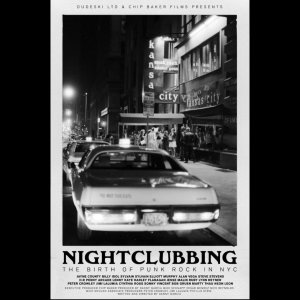 Nightclubbing: The Birth of Punk Rock in New York City
Nightclubbing: The Birth of Punk Rock in New York City
Wri/Dir: Danny Garcia
Its the 1960s in a rough neighbourhood in Manhattan. Max’s Kansas City is a restaurant with an upstairs bar and lounge, where musicians perform before small audiences. Its down the street from Andy Warhol’s factory whose denizens hang out there along with writers and artists. But everything changes when the Greenwich Village mainstay, The Gaslight, loses its lease. Its manager moves to Max’s and starts booking bigger and bigger acts. Velvet Underground, establishes its rep there, as a place for independent bands. Iggy Pop meets David Bowie at Max’s and start to collaborate, and the New York Dolls set up camp there. As its fame grows, punk becomes a phenomenon with lots of sex, drugs and rock ’n’ roll. Max’s washrooms double as a notorious site for quickies. Someone in the film says they everyone there was high all the time, with heroine the drug of choice. Malcolm McLaren shows up after  Sid Vicious leaves the Sex Pistols and becomes the Doll’s manager, bankrolling their rehab in exchange for them wearing his clothes on the stage. Though CBGBs ends up more famous, it’s Max’s that really starts the punk scene in NY.
Sid Vicious leaves the Sex Pistols and becomes the Doll’s manager, bankrolling their rehab in exchange for them wearing his clothes on the stage. Though CBGBs ends up more famous, it’s Max’s that really starts the punk scene in NY.
Nightclubbing is an oral history of the early days of the NY punk scene told by the musicians themselves, their fans and followers, staff at the clubs, family and friends. Featured artists include Billy Idol, Alice Cooper, Penny Arcade, Sylvain Sylvain, and many many others.
Illustrated with still photos and archive footage, it is meticulously researched and edited into a continuous seamless narrative. And the music never stops. Some people  are on the screen for just a few seconds, with maybe a simple line or two, while others, like Jayne County, provide the funniest and juiciest bits. And it’s a pretty juicy story. Like did you know Deedee Ramone’s girlfriend tried to pull a Lorena Bobbitt on him when she discovered he was hustling on 53rd st? Or that Max’s owners were busy counterfeiting hundred dollar bills in the back room? The club closed forever in 1981, but its legend lives on. If you’re into the history of early NY punk, Nightclubbing is a must-see.
are on the screen for just a few seconds, with maybe a simple line or two, while others, like Jayne County, provide the funniest and juiciest bits. And it’s a pretty juicy story. Like did you know Deedee Ramone’s girlfriend tried to pull a Lorena Bobbitt on him when she discovered he was hustling on 53rd st? Or that Max’s owners were busy counterfeiting hundred dollar bills in the back room? The club closed forever in 1981, but its legend lives on. If you’re into the history of early NY punk, Nightclubbing is a must-see.
Nightclubbing: The Birth of Punk Rock in New York City will be playing at the Carlton Cinema in Toronto on September 16th-18th; and you can catch Honk for Jesus, Save your Soul across North America starting this weekend; check your local listings.
This is Daniel Garber at the Movies, each Saturday morning, on CIUT 89.5 FM and on my website, culturalmining.com


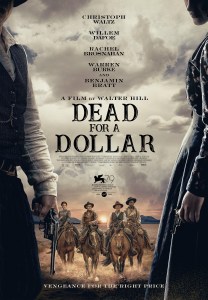
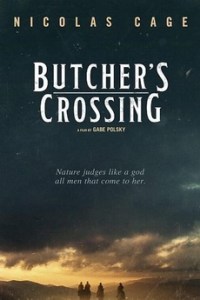

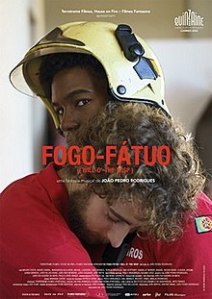

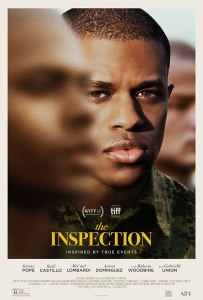
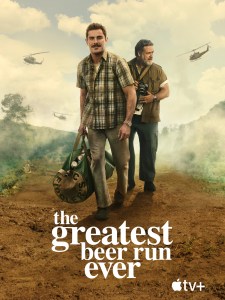



leave a comment